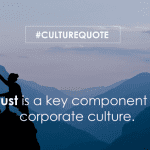Culture plays a role at almost every stage along the way
When most organizations begin to think about merging with or acquiring another organization as part of their growth strategy, culture isn’t front-of-mind. And that’s fine, at the beginning. Culture doesn’t tell you if you should start the M&A process, but it can direct your search for a new organization. So by the time your organization begins to have an idea of who they may want to acquire, it’s time Culture had a seat at the table.
Here’s how understanding and respecting the role of organizational culture will benefit your company in each stage of a merger or acquisition.
Cultural Due Diligence:
Once you have narrowed your potential target organizations, it’s time to do your background research. Cultural Due Diligence is about understanding your own company well enough to know how another might fit into it, deciding on what the end result of your merger will look like, and conducting background research into potential target organizations to understand their current culture and how it relates to your own.
Transition Planning and Team Alignment
This is your first chance to start working with key leadership to understand specific challenges facing integration and how to best face them. By planning early, you will be able to focus on conscious, explicit conversations, especially about what each organization expects the results of a cultural merger to look like.
Day 1 Integration Planning
Cultural integration begins on the first day of a merger or acquisition. Organizations benefit most by putting steps in place at the beginning to create new and lasting habits and align organizational cultures. By working with the Denison Organizational Culture Survey, you can diagnose and monitor areas of cultural synergy, best practices, and cultural blind spots.
Ongoing Culture Development
As the cultural integration progresses, employees feel most anxious about how this new dynamic will affect them personally. Leaders can reassure their workforce by following through on promises made in the early stages of the merger and communicating clearly among all parties during the opening months so that integration happens quickly and smoothly.
Let Culture Inform your M&A Process
What with all the upheaval caused by a Merger or Acquisition, it’s tempting to try to put Culture on hold until you feel less busy and more capable of giving it your full attention. However, you will be in a much better position throughout your M&A process if you bring culture in early.
For more depth on how culture can inform your M&A process at all these stages, read our posts:
Cultural Due Diligence: Helping Mergers and Acquisitions Succeed
Setting Expectations: M&A Transition Planning and Team Alignment




